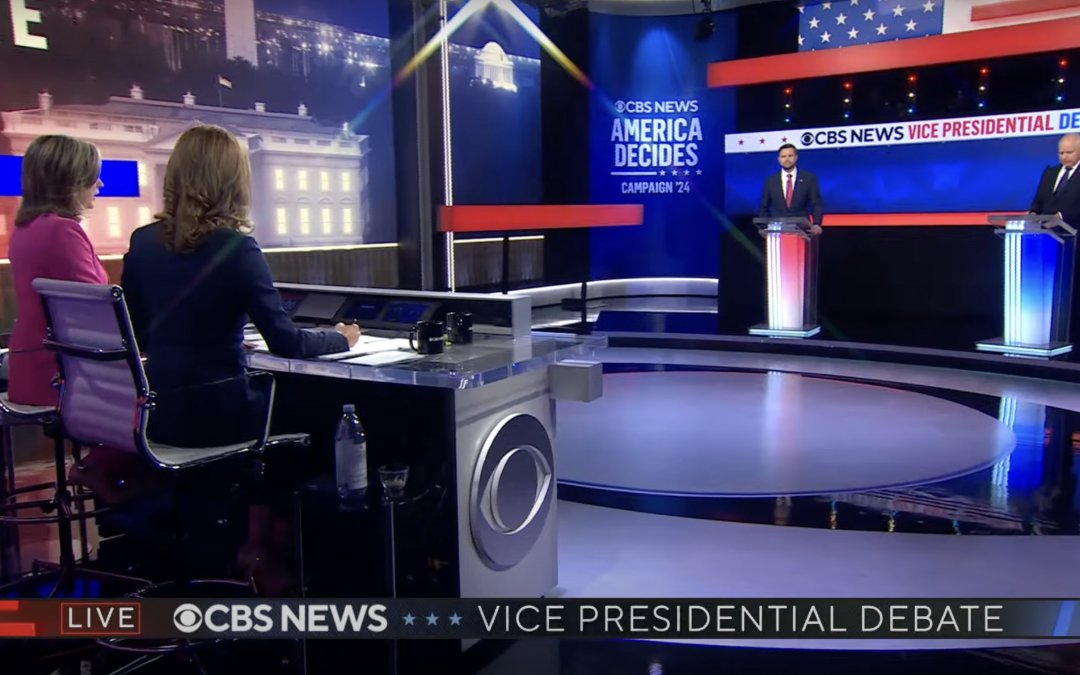WASHINGTON – The co-chair of the Commission on Presidential Debates criticized the moderators of Tuesday night’s CBS vice presidential debate, saying they “broke the rules” by attempting to fact-check JD Vance’s claim on Haitian immigrants arriving illegally in Springfield, Ohio.
“The moderator is not supposed to get involved with debating an issue with the person on the stage,” said Frank Fahrenkopf, 85, who has co-chaired the commission since its inception in 1987. “That’s for the other guy.”
The vice presidential debate was the first in 40 years not to be sponsored by the Commission on Presidential Debates, the nonpartisan organization which has overseen general election debates in every cycle going back to 1988. The shift signals a changing environment around presidential debates, which has gone from remarkable bipartisan stability to widespread norm-breaking.
Both major party tickets have continued to eschew the commission since President Joe Biden and former President Donald Trump broke with precedent by agreeing to a June CNN debate that ultimately proved fateful for the president’s re-election campaign.
At Tuesday’s debate, Minnesota Governor Tim Walz, the Democratic vice presidential nominee, accused Vance of demonizing Haitian immigrants in Springfield. Vance, an Ohio Senator and the Republican vice presidential nominee, stated that millions of illegal immigrants were competing with Americans for scarce homes in Springfield and across the country.
After Walz spoke again, CBS moderator Margaret Brennan clarified that Springfield, Ohio has a large number of Haitian migrants who have legal temporary protected status. Vance responded, “the rules were that you guys weren’t gonna fact-check,” before beginning to explain the mechanisms of a Customs and Border Patrol application which he alleged facilitated illegal immigration. As the moderators and candidate talked over each other, Vance’s microphone was turned off.
CBS had indicated prior to the debate that the moderators would not partake in live fact-checking, though that policy did not appear in the debate’s official rules. Claudia Milne, the senior vice president for standards and practices at CBS told the New York Times that “the moderators will give [the candidates] the opportunity to fact-check each other in real time.”
While three general election debates — two presidential, one vice presidential — have gone forth without the CPD, Fahrenkopf said he believes the public has lost a great deal in the commission’s absence.
“The public is missing a full analysis of the positions of the candidates on the issues that are important to the American people,” Fahrenkopf said. He said the typical format of commission debates, an uninterrupted 90-minute program separated into six 15-minute sections, allowed for more in-depth policy discussion.
In Fahrenkopf’s view, the nature of that format played into President Biden’s decision to propose alternative rules for the CNN debate. “The people in the White House and around the president knew that there is no way with his physical condition that he could stand up for 90 minutes without a break and for 15 minutes be concentrated on a subject,” Fahrenkopf said. The White House did not return Medill News Service’s request for comment.
Fahrenkopf, who chaired the Republican National Committee from 1983 to 1989, had several other objections to the way this cycle’s debates have been handled. He lamented the lack of a town-hall-style discussion that allowed ordinary Americans to question candidates and called for the return of live audiences to debates, which the commission used as an opportunity to invite guests from emerging democracies around the world.
He also raised legal questions surrounding the June CNN debate, which he alleged might have violated Federal Election Commission (FEC) regulations on objective criteria for qualification by limiting the debate to Biden and Trump before either candidate was on any state ballots. The FEC declined Medill News Service’s request for comment on this matter.
“[Circumventing the commission] removes debates as an expectation that voters can depend upon and puts it much more into the whims of the candidates, their campaign staff and the networks,” said Alan Schroeder, a professor emeritus of journalism at Northeastern University who wrote the book “Presidential Debates: Fifty Years of High-Risk TV.” “It’s just not as stable a set-up for debates as voters deserve,” Schroeder said.
In the weeks since the ABC debate, Vice President Kamala Harris and Trump have failed to agree on terms for a second debate. Harris recently proposed a CNN debate on October 23rd, while Trump has said he would debate Harris on Fox News since early August.
Despite the challenging negotiations, some argue this cycle has demonstrated that debates will endure in a future without the commission. Aaron Kall, who serves as the Director of Debate at the University of Michigan, said he does not expect the landscape of presidential debates to change very much. He added that the new rules introduced by networks, such as the muting of microphones and lack of live audiences, “made the debates more substantive and issue-focused.”
Fahrenkopf pointed out that the CPD arose in the first place after years of uncertainty surrounding presidential debates. No debates were held for three consecutive cycles between 1964 and 1972, and subsequent elections featured rules controversies including disputes over the political leanings of potential moderators. “We were originally created so that we wouldn’t be going through these arguments,” Fahrenkopf said.
He remains optimistic that the commission will retain its power over general election debates in four years time. “We hope between the end of this cycle and the 2028 cycle that enough public acknowledgment and complaint can be heard,” Fahrenkopf said. “We’re not going anywhere.”

